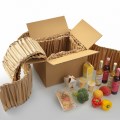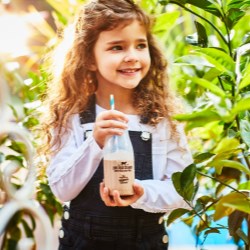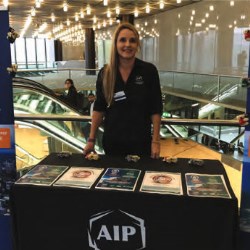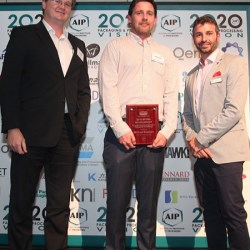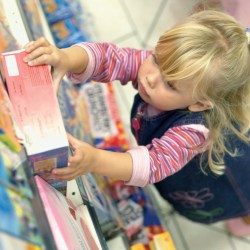If this is your company, CONTACT US to activate Packbase™ software to build your portal.
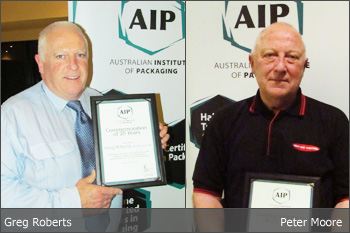

Pierre Pienaar FAIP, National President of the AIP, personally awarded Greg and Peter with their commemorative certificates at a recent function in Victoria where they both reminisced about their time in the packaging industry.
Greg Roberts started in the industry over forty years ago and his first job direct from school was as a Lab Assistant in the QA department at Cottee's Jam and Frozen Food Factory, Blackburn, Melbourne. "There was little specialisation in those days. QA was responsible for ingredient, packaging and product design and quality and this job was a great multi-functional experience," Mr Roberts said.
Peter Moore shared how he started in the industry in the very early 80s with Ken Alexander at Alexander Packaging, where he was introduced to Case Over Packers (COP) and hot melt adhesives. He then moved onto Ink jet printers selling Domino thru RAWCO Packaging/Pemara.
"After smelling the roses, (not MEK), I moved to Kempster and Love who were taken over by Heat and Control, where I am still working today. This adds up to 30 years or thereabouts in the packaging machinery side of the industry", Mr Moore said. One of the questions asked of both Greg and Peter was what they have seen changed over the last 25 years in the packaging industry.
According to Greg Roberts there have been a number of significant changes. "Firstly, the rate of new product development: during my first seven years at Cottee's we introduced 6 new products. Now a packing technologist may manage 30 to 50 introductions or changes a year. Unfortunately many of these new products don't last in the now very tough marketplace", Mr Roberts said. "Secondly, a number of companies have embraced SAP as their business management system. Wherever I have worked, this change has tied packaging technologists to the desk, slogging away at complex data entering processes, rather than getting out on to the shop floor and working with suppliers to optimise material performance. Thirdly, the consolidation of the Australian retail market is to me a major concern: imported products that are copies of Australian icons are being given prime shelf locations. As this trend continues, we will see favourite products, whole brands and even whole companies disappear. I predict that this will backfire on the retailers, as there ultimately will not be enough people employed and with money to spend in their stores," he said.
According to Peter Moore there have been many changes over the years but the one which has made the most impact in his opinion is Safety. "Safety starts with the design and carries all the way through to how the operator interfaces with the equipment and what emergency features are included. Of course there have been vast improvements in equipment itself in the last 25 years, with the ability to run faster produce packaged product more efficiently with minimum waste," Mr Moore said.
The National President also went on to ask them both what they believe is the most significant technology or advancement or product that they have seen revolutionise the packaging industry. "This is a tough one," Mr Moore said. "Being involved with packaging and inspection systems for the majority of my time but I would say the automation of the case packer. As the packaging of the product became faster and faster there was a need to automate the collation and cartoning of products and what you see today is the filling of the single unit and the then automatic collation, stacking and insertion into the carton plus in some instances Robots placing these onto pallets which are then automatically taken into the warehouse also by a Robot truck." Mr Moore said, "it is great to watch an automatic production line where from the primary packaging unit product is inspected, collated, packed in a carton (shipper) palletised, stretch wrapped, and moved off the warehouse all automatically, and as the full pallet moves out an empty one moves into to take its place. The system also monitors the empty pallet stack and loads this when required. Everyone has seen on television how the motor car industry has automated the manufacture of cars, and I feel we in the packaging industry can be proud of the way similar principals have been applied to the food industry in general and I know there are more innovations out there waiting to be brought to what we do."
When asked this question at the AIP dinner Greg Roberts suggested that Hot Melt adhesives have had a major impact – much higher machine speeds using smaller footprints. "Upon reflection, I think that the computer has had a much larger impact – communications, design systems such as Ispek, Cape and Topps, digital artwork and digital plate making. The whole print development process is now very streamlined, and the final quality a vast improvement on designs 30 to 40 years ago. (and I wouldn’t be without Excel)."


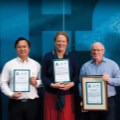
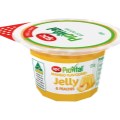


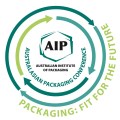
.jpg)







